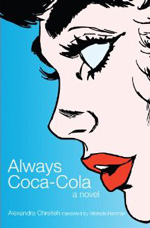

Interlink Publishers, paperback, 9789781566568432
My friends and I, all twenty-somethings early into our careers, are typical young women. We gossip about relationships and men, dream big dreams about our futures, and have secure jobs that allow us to afford the brand name clothing and accessories we covet. Reading Alexandra Chreiteh's novel Always Coca-Cola, I found these elements of my own life reflected back at me. Abeer, a young woman living with her parents in Beirut, and her friends Yana and Yasmine, are women with whom I would be friends; they spend their afternoons at Starbucks, have conversations about marriage that are as cynical as they are genuine, and love to laugh.
Yet life in Beirut is also wildly different from my reality. Abeer struggles to balance her conservative, traditional upbringing with her friends' modern morals. Yana, who is separated from her husband, shocks Abeer, who believes in the "forever" aspect of wedding vows; when Yana announces that she is pregnant, Abeer hopes that the baby's father is Yana's husband, even though the couple has not seen each other in months. The idea that Yana would be intimate with a boyfriend is one Abeer refuses to accept. Even more shocking is the fact that Yana is the star of a Coca-Cola ad, posing only in a red bikini. Yana's ad graces a billboard that stands across the road from Abeer's house, and is the view from her bedroom. Yana's life symbolizes all that Abeer wants, but also everything of which she is scared.
Chreiteh effectively balances the familiar with the unfamiliar; the cultural references—everything from Always sanitary pads to Starbucks lattes—drew me into Abeer's world, which seemed so like mine. Her friendships with Yana and Yasmine paralleled my own relationships, and I felt like I could easily join their gossipy conversations about men and sex. However, in an instant that sense of familiarity was shaken, and plot developments reminded me that while these women may lead lives that on the surface are much like mine, their society has vastly different beliefs. Freedoms that I take for granted are not guaranteed, and being a woman is not about equality.
Translator Michelle Hartman includes a note that sheds light on the modern, informal language used in the text, and chronicles her struggle to maintain the original's global appeal while still staying true to Chreiteh's linguistic play and specific references to Beirut society. Her translation certainly makes use of colloquial English, but it is at times choppy and confusing. Transitions between scenes and jumps in time are unclear, and the text would benefit from some sort of chapter demarcation, rather than being one continuous piece.
For such a short novel, Always Coca-Cola packs a punch. I read it from cover to cover in one sitting,
and was surprised at how it affected me. The characters' edgy humour helped soften their controversial opinions,
but underneath the jokes and sarcasm was a serious look at a society rife with contradictions and double standards.
Read an excerpt of Always Coca Cola in Belletrista's previous issue
